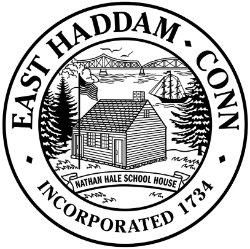Commission Members
Ronald I. Gross (R), Chairman
Bonita V. Buongiorne (U)
Ronald M. Distefano (R)
Carleen G. Quinn (R)
Aaron P. Taylor (D)
Alternates
Mark F. Hendersen (U)
Shaleen B. Thody (U)
Vacancy
1 Plains Road
P.O. Box 385
Moodus, CT 06469
860-873-5021 (phone)
860-873-5025 (fax)
The Agriculture Commission meets in the Municipal Office Complex, 1 Plains Road, Moodus on the first Monday of each month, with the exception of holidays. Meetings begin at 7:00 p.m. The public is encouraged to attend.
Authority
Family farms and the rural landscape they represent are being lost at an alarming rate in Connecticut. East Haddam is among the several towns which have lost valuable farmland to residential development. According to the 1950 Census of Agriculture, there were 15,615 farms in Connecticut using about 40 percent of the land area in the state (1,254,144 acres of the 3,135,360 total). By 2002, the number of farms dropped to 4,191 and 357,154 acres. During the same period, in Middlesex County, the number of farms had plummeted to 326 from 1,039. This was a change in farmland area from 76,595 to 17,806 acres. It is interesting to note that in 2007 the number of farms increased to 393, but the amount of land devoted to farming decreased to 16,623 acres and the size of an average farm was reduced to 42 acres from 55.
Agriculture is an important element of the rural character of East Haddam. It is not difficult to see how far we have come from our early agricultural heritage when one views the many stone walls, now mostly shrouded in trees and separating subdivisions. These walls are a connection to the many farms that once covered the majority of our town landscape.
The importance of agriculture is expressed very well in the publication, “Planning for Agriculture” – “Farms and farmland remain cornerstones of many Connecticut communities, linking the past to the future through a landscape of fields and pastures, stone walls and weathered barns shaped by generations of hard-working farm families. This landscape, cherished by so many, is often taken for granted. Some of its benefits are obvious-the bounty of fresh fruits and vegetables in the spring and summer months; pumpkins, chrysanthemums and Christmas trees in the fall and winter; and milk and dairy products year-round. Other benefits are less obvious-the local revenue and jobs farms provide, the recreational and tourism opportunities they create, the wildlife habitat and other environmental benefits they offer. Some benefits are easily quantified; many are not. The benefit that may be most valued by Connecticut residents – the ephemeral “quality of life” that farms help to provide – unfortunately sometimes is only recognized after it’s too late and the last farm in town has disappeared.”
It is therefore incumbent on the Town of East Haddam to endeavor to preserve, protect and promote the few remaining farms contributing to its unique rural character, to encourage new agricultural enterprises and to insure that our community has a local source of food for the future.
Duties / Responsibilities – The Agricultural Commission shall be an advisory board with the following duties and responsibilities:
Advocacy: To act as an advocate for local agriculture.
Information: To serve as a conduit between non-profit agencies, civic organizations, municipal boards and commissions, elected officials and local farmers.
Education: To recommend changes in local law, regulations, rules and practices of town departments, boards and commissions regarding compatibility with all forms of agriculture, farms and farming as defined in Connecticut General Statues. To educate town government about agricultural laws, such as Right to Farm, and legal issues regarding farm machinery, buildings and operations. To provide information and guidance on agriculture-related issues-such as zoning, inland wetlands, public works and others-to town departments and other boards and commissions as necessary. To act as a sounding board / provide review / to town departments, boards and commissions concerning the impact of proposed town policies on farms. To support vocational/agricultural education of young farmers and new farmers. To support local and regional agriculture education programs.
Conflict Resolution: To serve as a resource for information and non-binding advice for residents, established town committees and departments concerning resolution of agriculture related conflicts.
Economic Opportunities: To identify innovative opportunities for farming in East Haddam. To promote opportunities for residents and local businesses to support and value farming. To serve as a conduit between non-profit agencies, funders, and local farmers. To work to create a climate that supports the economic viability of farming as a career in East Haddam. To create a sustainable agriculture community. To work with local land use boards and commissions and East Haddam’s Open Space Committee to secure the land base necessary for future agricultural uses.
